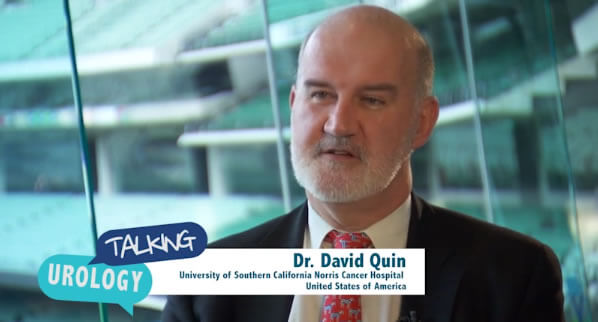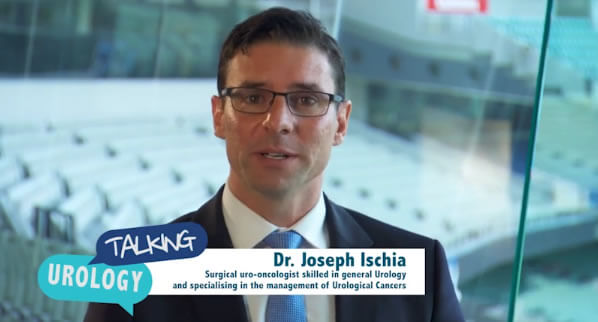ANZUP 2017 – Dr Craig Gedye
Dr Craig Gedye discusses new biomarkers for kidney cancerTalking Urology podcast transcript
ANZUP 2017 Interviews - Joseph Ischia and Craig Gedye
Joseph Ischia: Thanks for joining us Craig. You gave a fantastic talk today on the kidney cancer biomarkers that are currently available. I’m just wondering if you could give us a little bit of some of the key points that you spoke about. We’ll start by talking about the diagnostic techniques that are on the horizon for detecting kidney cancer.
Craig Gedye: Thanks Joe. Look, the problem we have at the moment is we don’t have a lot of particularly predictive or prognostic biomarkers for renal cell cancer. We don’t have a PSMA blood, test, we don’t have a PSMA scan, so we need something to give people better advice about what to do and what the future might hold and even better treatment is right for them. There’s a lot of work going on to understand things from blood tests but there’s a number of technologies on the horizon. I think it’ll be really interesting. Things like circulating tumor cells, they’ve been hard to find and kidney cancer because the proteins on the surface of a kidney cancer cell are different from other cancer cells. But I think some groups are starting to get closer to those. The other one are microRNAs and they’re becoming more and more relevant in different kinds of cancer. I think there’s certainly evidence in kidney cancer that you can find microRNAs that can predict what’s going to happen for a person and then those might actually be ones that you could use to then surveil people, watching in their blood, watching their urine. We’ll see what we get from those.
Joseph: Excellent. I was particularly interested by one marker you mentioned which is actual patient toxicity to the treatments. Can you tell us a little bit about this?
Craig: Who would have thought that listening to people was a good thing to do.
Joseph: Well, no.
Craig: This is work and this is not my work but something does suggest some trials for us. But this is work from Gill Biyanesen who’s in Toronto and he and a bunch of colleagues across Canada have done some wonderful work where they have individualized the dosing for tyrosine kinase inhibitors. In this case mostly Sunitinib and by individualizing the dosing to make sure that people experienced grade 1 toxicity but not grade 2. As long as they are getting some grade one toxicity, there’s a suggestion that those people are getting an adequate dose of their tyrosine kinase inhibitor and as such those people do a lot better and the results are remarkable. The results in a community setting exceed the results of the clinical trial.
Joseph: That’s amazing isn’t it? Chris, quickly move on to another thing you spoke about which is, how can the lymphocyte and macrophage signature of a clear cell cancer be used to direct therapy?
Craig: The work that we’ve published recently is unbelievable. I was just humbled to be part of that process. The understanding the atlas now of all of the immune cells that are in a cancer is giving us an opportunity to figure out who might respond to a single agent PD1 drug who might need an additional treatment who might not respond at all. This is potentially the start of predictive biomarkers for immunotherapy in renal cell cancer. As luck would have it, we’ve got a clinical trial coming out called The KEYPAD study—
Joseph: Which is a great acronym.
Craig: Thank you.
Joseph: You’ve done well.
Craig: We spent a lot of money on that, no we didn’t. The KEYPAD study is kidney cancer, Pembrolizumab and Denosumab. Denosumab is a drug that is used for bone health and prostate cancer, in breast cancer. It’s also used routinely for osteoporosis, but it works on cells that are called osteoclasts and osteoclasts are actually just macrophages, which just happen to be in the bone. If you’ve got these macrophages that we want to target in kidney cancers and we want to influence the immune response in those cancers, it seems that we’ve come full circle and it’s a great opportunity to combine these two drugs and see what we get out of them. Now, case reports have suggested that adding Denosumab to drugs like Pembrolizumab or Nevolimab or Epilimumab, improves the response in patients. And so, we’re going to be fascinated to find out if that’s the case in kidney cancer.
Joseph: Excellent. Thank you very much Craig. It has been a pleasure chatting to you.
Joseph: Thanks so much.












